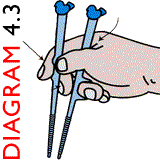Jonathan Gibbs
SUGGESTED VENUES FOR GRIEVING (PARTS 4-7)
THE BEACH
Pick up stones and throw them in the sea. Throw them out to, throw them at the sea. Pick up the stones, individually or by the handful and shy them, hurl them, loose them at the rising flat muddy plane of the sea. We say stones, we could mean pebbles, would accept shingle. We counsel against sand or cliff edges. Leave these places to their own, no less limiting scripts and narrative arcs. The beach is a fine place to grieve, but the novice should beware. Unlike other venues treated here, it does not draw you back into the stream and traffic of life, is not concerned with helping you detach that part of the deceased person you would carry with you from the indigestible bolus of their absence; rather, the beach draws you out, towards them. Setting itself up as a neutral territory, a no-man's-land of the soul, the beach is a liminal zone, a Checkpoint Charlie, a potentially treacherous place for those that cannot control the tides, or at the very least swim.
THE KITCHEN TABLE
Lay your head on the table and your arms on either side of it. Lie your head this way, and you are faced with a partial inventory of culinary detritus: ketchup bottle, upturned salt cellar, stainless steel cutlery. That way, the sink and the window. Most likely the sink, but more properly the window needs cleaning. The window will always need cleaning. The time does not exist in which it is, was or will be free of smeared dirt. Dirt, though, does not prevent the light from getting through. The dirt throws the light into relief, down-shifts it into visibility. In the olden days, churches and cathedrals told religious stories to the illiterate masses through the medium of stained glass windows, and your kitchen window might serve in a similar respect. The light is the divine, the ineffable; the dirt, the transient, the fallen, the human: that kind of thing. Sat head rested on the kitchen table you can plan, or contemplate planning, the rest of your life, safe in the knowledge that those things you will most need—corkscrew, can opener, absorbent paper towels—are close at hand.
THE MOON
A moon landing is one of the most complex, dangerous and costly operations that mankind has yet found itself capable of, so think carefully before committing yourself. You will have so many operational matters to occupy your mind—checking the tricksy fixings of your space suit, radioing reports back to earth, carrying out the mundane round of scientific experiments that, quite frankly, could have no conceivable interest to those outside a narrow coterie of boffins—so much to do, in short, that personal matters may well get squeezed right out of the schedule. And for god's sake, don't mention grieving on your application form: you probably won't even get an interview. Yet those that have undergone this extraordinary experience have vouched that it carries a definite spiritual dimension. This, we must assume, was not planned for by the space agencies. Consider: the unique perspective on the home planet, the appreciation of the vastness of space, the sheer animal pull of rocket-powered acceleration. And, on the moon itself, the regression to relative weightlessness, the boundless joy you will feel in this uninhabited sphere, all yours to tour and rule, the glee occasioned by this splendid game of hide-and-seek. But—oh! then you stop, and think.
NEXT DOOR'S LAWN, 4AM
Geraniums, gardenias, nasturtiums, you can't name them, but you know they're here. Among the dumb suspects laid out on the lunar greensward of next door's lawn. You pace along the row and back again. They make a pitiful sight. Terminally obstinate interrogatees. Downed pigeons. A well-aimed kick pierces the turf, you agitate the foot from side to side, and lift and follow through. A divot frees itself from the earth and skips a yard. Dumped out of its element it lies gasping, like a washed-up jellyfish. The underside of the clod dangles pale grass roots like brain gunk from a scalp. By day you have seen your neighbours cultivate their garden, a permanent labour to no perceivable end. Kneeling at the beds that line the walls of the house, they are tending, you think with a sneer, their own graves. Now an empty bottle sails through the air, cutting the infa-red beam of the security spotlight and tripping on the halogen lamp just too late to catch the shards of glass falling from wall to patio. Silence. No one stirs. The night sneers back at you. The smash elsewhere, the light a fox. Now you could holler. Stamp and dance, jump onto the teak bench, feet on the back rest, forcing it over and down with your momentum. Swing from the tender branches of the young apple tree until they break. Start in on the flower pots. That would show them. Wake them, quite literally, up. Wake them all up. Every last one of the ignorant sleeping fuckers. Let them come down here, mano a mano, all of them, mano a mano a mano a mano, and deal with this thing, once and for all, face to face. Face to face to face to face. Have it out and have done with it. Come on.
____
A simple satire on the bereavement memoir genre. Venues 1-3 (The Park, The Office, The Bar) appeared on mcsweeneys.net, appropriately enough. The kitchen, now I come to think of it, is modelled on the kitchen in West Hampstead where my friends Joel, Alex, Ian and Sarah shared a flat and on whose table, no doubt, I rested my head many times.
